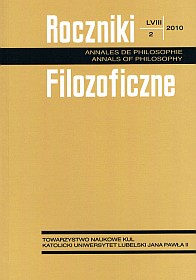The Themes of Giles’s of Rome and Thomas Aquinas’s in the Concept of esse in John Versor’s Philosophy
Abstract
The aim of this article is to show that John Versor’s concept of esse presented in his commentary on De ente et essentia by Thomas Aquinas is not in accordance with the Thomistic view. Versor distinguishes two kinds of esse: esse essentiae and esse existentiae. The former pertains to non-substantial beings, and the latter pertains only to the substances. Additionally, esse existentiae is regarded as the proper act of substance. This theory of “double esse” is not to be found in Aquinas’ works; yet, it has been worked out by Giles of Rome, who seems to be the source of inspiration for Versor. Moreover, the further influences of Giles of Rome upon Versor’s philosophy can be found in his consideration of real difference between essence and existence. Therefore, in respect of the concept of esse, due to influences of Giles of Rome, John Versor cannot be regarded as the follower of Thomas Aquinas in the strict sense.
References
Ashworth E.J.: The Eclipse of Medieval Logic, [w:] N. Kretzmann, A. Kenny, J. Pinborg (red.), The Cambridge History of Later Medieval Philosophy, Cambridge: Cambridge University Press 1986.
Birkenmajer A.: Die Wiegendrucke der physischen Werke Johannes Versors, [w:] tenże (red.), Études d’histoire des sciences et da la philosophie du Moyen Age, Wrocław–Warszawa–Kraków: Ossolineum 1970.
Bos E.P.: John Versor’s Albertism in his Commentaries on Porphyry and the Categories, [w:] P.J.J.M. Bakker, E. Faye, Ch. Grellard (red.), Chemins de la pensée médiévale. Études offertes à Zenon Kaluza, (Textes et Études du Moyen Âge, 20), Turnout: Brepols 2000.
Hoenen M.J.F.M.: Late medieval schools of though in the mirror of university textbooks. The “Promptuarium argumentorum” (Cologne 1492), [w:] tenże, J.H.J. Schneider, G. Wiveland (red.), Philosophy and learning: universities in the Middle Ages, Leiden: Brill 1969.
Idzi Rzymianin: Twierdzenia o istnieniu i istocie, tłum. J. Surzyn, Kęty: Wydawnictwo „Antyk” 2005.
Klima G.: The Changing Role of Entia Rationis in Medieval Philosophy: A Comparative Study with a Reconstruction, „Synthese” 96 (1993), s. 25-59.
Markowski M.: Die Wissenschaftlichen Verbindungen zwischen der Kölner und der Krakauer Universität im Mittelalter, [w:] A. Zimmermann, Die Kölner Universität im Mittelalter: Geistige Wurzeln und Soziale Wirklichkeit, (Miscellanea Mediaevalia, 20), Berlin–New York: De Gruyter 1989.
Prantl C.: Geschichte der Logik im Abendlande, Bd. 1-4, Berlin: Akademie-Verlag 1955.
Rutten P.: „Secundum processum et mentem Versoris”. John Versor and His Relation to the Schools of Thought Reconsidered, „Vivarium” 43 (2005), no. 2, s. 292-336.
Seńko W.: Kilka uwag na temat historii Tomaszowego pojęcia istnienia we wczesnej szkole tomistycznej, [w:] „Przegląd Tomistyczny” 3 (1987), s. 21-27.
Sweeney L.: The Meaning of Esse in Albert the Great’s Texts on Creation in Summa de Creaturis and Scripta Super Sententias, „The Southwestern Journal of Philosophy” 10 (1979) no. 3, s. 65-95.
Swieżawski S.: Dzieje europejskiej filozofii XV wieku, t. 1: Poznanie, Warszawa: ATK 1974.
Swieżawski S.: Dzieje europejskiej filozofii XV wieku, t. 3: Byt, Warszawa: ATK 1978.
Tomasz z Akwinu: Opera omnia, www.unav.es/filosofia/alarcon/amicis/ctopera.html
[Wersor J.]: Quaestiones magistri Johannis Versoris super De ente et essentia sancti Thomae de Aquino Ordinis Fratrum Praedicatorum, Coloniae: H. Quaentell 1487.
Wersor J.: Quaestiones super Metaphysicam Aristotelis, cum textu, Coloniae: H. Quentell 1486.
Wersor J.: Quaestiones super veterem Artem Aristotelis, Coloniae: H. Quentell 1487 (przedruk: Frankfurt: Minerwa 1967).
Copyright (c) 2010 Roczniki Filozoficzne

This work is licensed under a Creative Commons Attribution-NonCommercial-NoDerivatives 4.0 International License.





